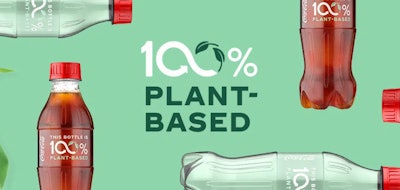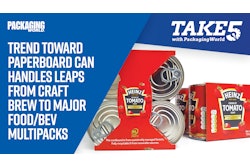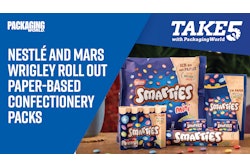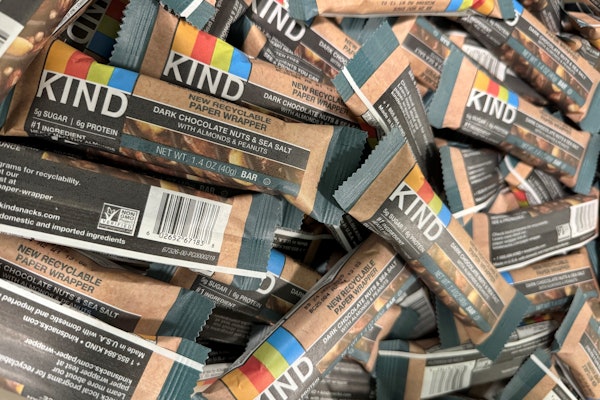The Coca‑Cola Company’s sustainable packaging journey has crossed a major milestone this week with the unveiling of its first-ever beverage bottle made from 100% plant-based plastic, excluding the cap and label, that has been made using technologies that are ready for commercial scale. The prototype bottle comes more than a decade after the company’s PlantBottle debuted as the world’s first recyclable PET plastic bottle made with up to 30% plant-based material. A limited run of approximately 900 of the prototype bottles have been produced.
“We have been working with technology partners for many years to develop the right technologies to create a bottle with 100% plant-based content—aiming for the lowest possible carbon footprint—and it’s exciting that we have reached a point where these technologies exist and can be scaled by participants in the value chain,” says Nancy Quan, Chief Technical and Innovation Officer, The Coca‑Cola Company.
PET comprises two molecules: approximately 30% monoethylene glycol (MEG) and 70% terephthalic acid (PTA). The original PlantBottle, introduced in 2009, includes MEG from sugarcane, but the PTA has been from oil-based sources until now. Says Coca-Cola, PlantBottle packaging looks, functions, and recycles like traditional PET but has a lighter footprint on the planet and its resources.
The company’s new prototype plant-based bottle is made from plant-based paraxylene (bPX)— using a new process by Virent—that has been converted to plant-based terephthalic acid (bPTA). Says Coca-Cola, as the first beverage packaging material resulting from bPX produced at demonstration scale, this new technology signals a step-change in the commercial viability of the biomaterial. The bPX for this bottle was produced using sugar from corn, though the process lends itself to flexibility in feedstock.
The second breakthrough technology, which The Coca-Cola Company co-owns with Changchun Meihe Science & Technology, streamlines the bMEG production process and also allows for flexibility in feedstock, meaning more types of renewable materials can be used. Typically, bMEG is produced by converting sugarcane or corn into bioethanol as an intermediate, which is subsequently converted to bioethylene glycol. Now, sugar sources can directly produce MEG, resulting in a simpler process.
UPM, the technology’s first licensee, is currently building a full-scale commercial facility in Germany to convert certified, sustainably sourced hardwood feedstock taken from sawmill and other wood industry side-streams to bMEG.
“The inherent challenge with going through bioethanol is that you are competing with fuel,” says Dana Breed, Global R&D Director, Packaging and Sustainability, The Coca-Cola Company. “We needed a next-generation MEG solution that addressed this challenge, but also one that could use second-generation feedstock like forestry waste or agricultural byproducts. Our goal for plant-based PET is to use surplus agricultural products to minimize carbon footprint, so the combination of technologies brought by the partners for commercialization is an ideal fit with this strategy.”
In 2015, Coca-Cola unveiled its first prototype for a 100% bio-based PlantBottle at the Milan Expo using lab-scale production methods to produce bPX. This next-generation 100% plant-based bottle, however, has been made using new technologies to produce both biochemicals that make the bottle and are ready for commercial scaling.
“Our goal is to develop sustainable solutions for the entire industry,” Breed says. “We want other companies to join us and move forward, collectively. We don’t see renewable or recycled content as areas where we want competitive advantage.”
Since introducing PlantBottle, Coca-Cola has allowed non-competitive companies to use the technology and brand in their products—from Heinz Ketchup to the fabric interior in Ford Fusion hybrid cars. In 2018, the company opened up the PlantBottle IP more broadly to competitors in the beverage industry to scale up demand and drive down pricing.
As part of its World Without Waste vision, Coca-Cola is working to make all its packaging more sustainable, including maximizing use of recycled and renewable content while minimizing use of virgin, fossil material. The company has pledged to collect back the equivalent of every bottle it sells by 2030, so none of its packaging ends up as waste and old bottles are recycled into new ones; to make 100% of its packaging recyclable; and to ensure 50% of its packaging comes from recycled material.
This innovation supports the World Without Waste vision, specifically the recently announced target to use 3 million tons less of virgin plastic from oil-based sources by 2025. The Coca‑Cola Company will pursue this 20% reduction by investing in new recycling technologies like enhanced recycling, packaging improvements such as light-weighting, alternative business models such as refillable, dispensed and fountain systems, and the development of new renewable materials.
In Europe and Japan, Coca-Cola, with its bottling partners, aims to eliminate the use of oil-based virgin PET from plastic bottles altogether by 2030, using only recycled or renewable materials. While the majority of plastic packaging material will come from mechanically recycled content, some “virgin” material will still be needed to maintain quality standards. That’s why Coca-Cola is investing in and driving innovation to boost the supply of feedstock from renewable technologies as well as from enhanced recycling technologies. Enhanced recycling “upcycles” previously used PET plastics of any quality to high-quality, food-grade PET.
“We are taking significant steps to reduce use of ‘virgin,’ oil-based plastic, as we work toward a circular economy and in support of a shared ambition of net-zero carbon emissions by 2050,” Quan says. “We see plant-based plastics as playing a critical role in our overall PET mix in the future, supporting our objectives to reduce our carbon footprint, reduce our reliance on ‘virgin’ fossil fuels and boost collection of PET in support of a circular economy.”


























